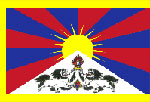
Reporters Without Borders has expressed anger at ‘the systematic violation of press freedom and free expression’ in Tibet. Presently ruled by the Chinese authority, Tibet is no way or little exposed to foreign journalists. Adjacent to India, the region is almost landlocked, where nobody except the Chinese are allowed to visit easily and report about the region.
“Foreign journalists are finding it increasingly difficult to visit the Himalayan province and free speech is being suppressed even more ruthlessly there than in the rest of China,” said an official statement of the Paris based media rights body, also known as Reporters sans Frontiers (RSF). It also added that RSF had already urged the Chinese authorities to allow foreign journalists to visit Tibet and the Tibetan regions freely.
The statement (now available at http://www.rsf.org/article.php3?id_article=30510) also revealed that the authority had arrested the editor of a Tibetan website. Moreover, a Tibetan culture website has been closed and SMS services have been suspended in parts of Sichuan province in the last few days.
Kunchok Tsephel Gopey, the editor of the Tibetan website Chomei (The Lamp), was arrested in Gannan on February 26. It is feared that Gopey is being mistreated, as the authority did to him during his earlier jail term in 1995. Relatives said the police searched his house and confiscated his computer. The Internet connectivity has been slow in the Tibetan regions.
“We also call on them to grant the Tibet-based media more editorial freedom and to stop jamming international radio stations broadcasting in the Tibetan language,” the RSF statement insisted adding, “The crackdown launched after the events of March 2008 have never stopped. The authorities have gone to great lengths to impose the official version of events, denying the existence of Tibetan victims.”
The foreign press has been unable to visit Tibet freely for decades and the controls were tightened after the events of March 2008. On the eve of the Tibetan New Year and the 50th anniversary of the uprising, foreigners have been forbidden all access to Tibet until April 1, making the presence of independent observers impossible. Foreign tourists in Lhasa, the capital of Tibet, have also been asked to leave the place as quickly as possible.
Even if the foreign journalists arrive in Tibet, often on tourist visas, they find that Tibetans are scared to talk to them. There is a general feeling of mistrust and paranoia as a result of the massive presence of security forces and the security cameras installed in many places in the city,” informed a European journalist who visited Lhasa in 2008.
Many local residents in Lhasa believe that there are microphones and cameras at street corners, in shops and in taxis.
|
|


Comments: